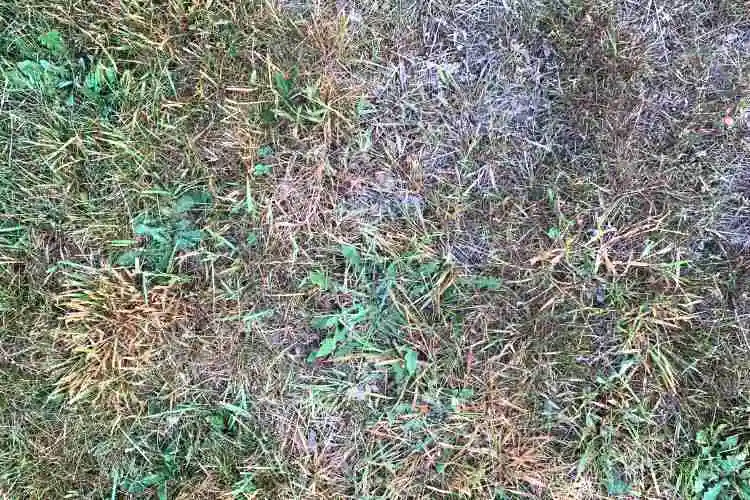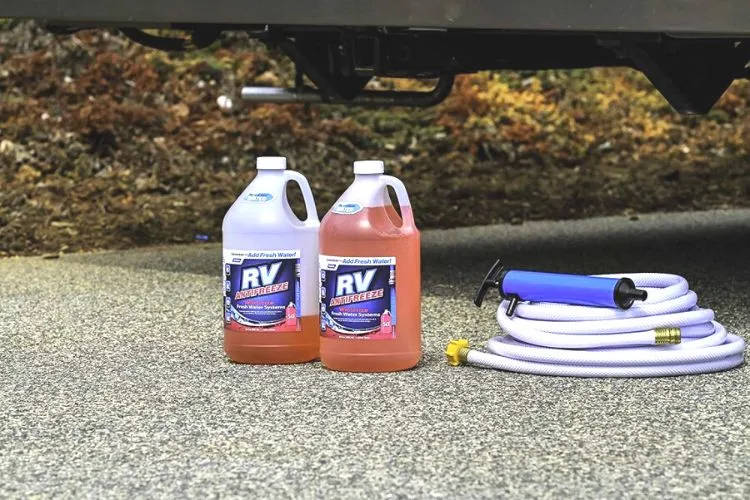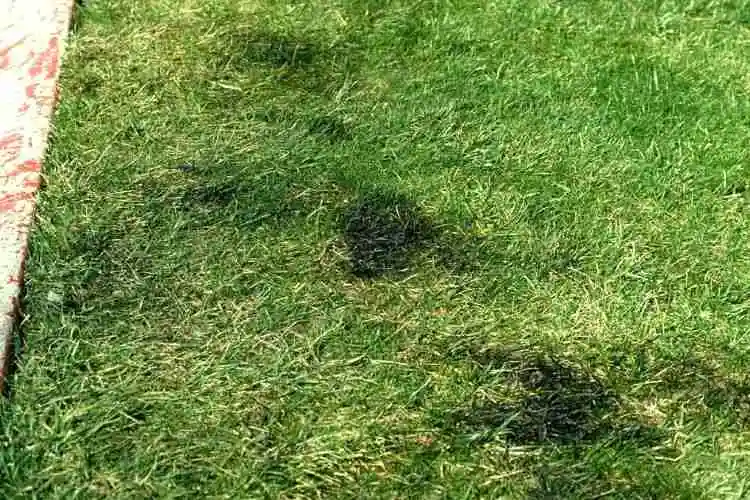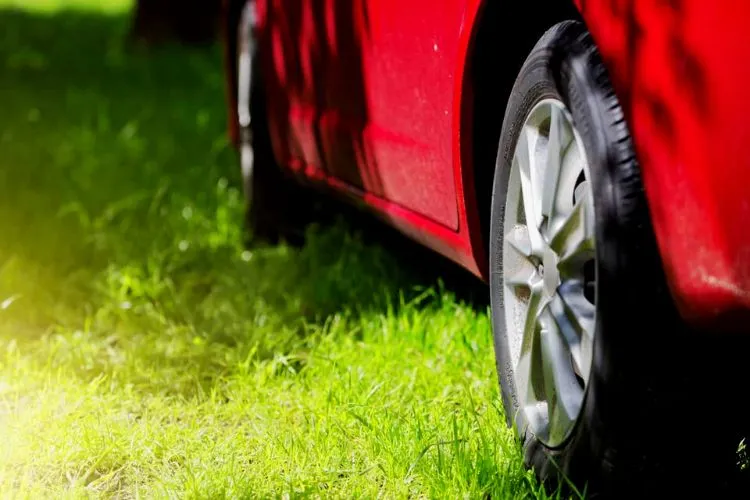Antifreeze contains ethylene glycol and other impurities that can harm the grass. An engine or coolant container leakage may result in spilling the antifreeze on the grass.
The toxic solution spilled on the lawn may affect it adversely, eventually killing the plants. Let’s explore the question “does antifreeze kill grass?”, in more details.

Does antifreeze kill grass?
Yes, antifreeze kills grass. Antifreeze is categorized into two types; Ethylene glycol-based and Propylene glycol based. Ethylene glycol-based is more dangerous than the other. It will immediately start its adverse reaction on the grass.
It also affects and kills other vegetation wherever it gets interacted with. If spilled in large amounts, it will penetrate the soil, mix with water sources and destroy the root systems of any plant.
Wherever the antifreeze spills, the area will appear discolored and patchy. It reduces the grass growth by 80% as water absorption by roots goes down. Eventually, it will result in the death of the grass. It will also deter weed, shrub, and tree growth wherever it spills.
Propylene glycol-based, if diluted, is less harmful and softer on grass.
Will spilled antifreeze kill grass?
Yes, spilled antifreeze kills grass and other vegetation also; if they come in contact with it. Though a biodegradable antifreeze is safer to use; but will have adverse effects on the grass, eventually.

Antifreeze without water can kill the grass. Adding water to it will dilute the antifreeze. If the diluted antifreeze contains ethylene glycol, it will kill the grass. Ethylene glycol is toxic and will slowly kill the grass by reducing its growth.
Propylene glycol on the other hand isn’t hazardous. It will cause yellowing of the grass, but it won’t kill it. Pollutants like copper, zinc, lead and 1-4 dioxane present in antifreeze will restrict the growth of grass.
Will RV antifreeze kill grass?
It depends on the toxicity of the RV antifreeze. A diluted RV antifreeze won’t hamper the growth of the plants. But if used in high proportion, it may be dangerous. Commonly available RV antifreeze are:

- Ethanol: Used in automobiles as antifreeze. Toxic for plants and grass.
- Ethanol and ethylene glycol blend: Can be suitable as antifreeze for automobiles. Toxic for plants, grass, and human as well.
- Propylene blend with ethanol: Used in automobiles. Toxic for plants, and less toxic for humans.
- Propylene glycol: Least toxic for plants. But that does not mean it is harmless.
Out of the above, Propylene Glycol RV antifreeze is proven to be the safest of all if diluted with a significant amount of water. They won’t affect the plants if diluted substantially.
How do you clean antifreeze out of grass?
It’s crucial to clean the antifreeze out of the grass immediately. Else it will start killing the grass. Herewith are stepwise instructions to cleanse the antifreeze out of the grass.
Nullify the effect of the spill
Clean the spill as quickly as you can and nullify the effect. Nullify the spill effect by adding sand, clay, ash, sawdust, or cat litter to control the antifreeze spills.

- Baking soda is known to kill grass primarily, but still you can use it to nullify the antifreeze spill. Use baking soda whenever the spills are of negligible quantity. Spatter a substantial amount of baking soda in the spilled area and its surroundings. It will prevent the spread of adverse effects of the spill. Clean the area after 30 minutes.
- Use absorbent materials, such as sponges, newspapers, or lay towels to absorb the spilled antifreeze. It will prevent the further spreading of the antifreeze. Use these materials till the spilled antifreeze is completely absorbed.
- Wait about 1 to 3 hours for the materials to fully absorb the antifreeze.
- Collect the absorbents and trash them along with the towels. Since the absorbed materials are soiled with antifreeze, dispose of them by packing them in a heavy-duty plastic bag or trash bag.
- The remaining dried antifreeze can be flushed using a hose with water. Leave the affected area to air dry. Check whether the grass has developed any stains after the spillage.
- If you notice any stains, repeat the process till you get rid of all the spilled antifreeze.
Protips while cleaning spilled antifreeze on grass
- Wear a nose mask and protective gloves. It will prevent inhaling the antifreeze or getting in contact with your skin.
- Ensure pets and children are at a distance from the spilled area.
- Cleanse all the used equipment exhaustively.
- Store your antifreeze in a labeled container away from kids.
How long does antifreeze stay in the ground?
Ethylene glycol and propylene disintegrate into water and carbon dioxide when spilled. The duration of breaking down of these antifreeze depends on the soil temperature. It may take several days, weeks, or months too.

The disintegration rate is faster in soils with high temperatures and rich in organic components. Complete dispersion in the air takes about ten days.
The disintegration of the glycol in the soil lowers its pH. Propylene glycol-based antifreeze disintegrates faster than Ethylene glycol-based. Disposing of antifreeze in the environment may harm humans, water bodies, and plants. Therefore, avoid disposing of it in the air.
You May Also Find Useful: Should You Water The Lawn After Applying Fungicide? | Why Is My Grass Turning White?
frequently asked questions (fAQs)
What does antifreeze do to the soil?
Antifreeze spilled onto the soil lowers its pH. It will also interact with the grass and other vegetation, adversely affecting their growth and killing them. When mixed with water and air, it is toxic for humans, pets, and plants.
Can you pour antifreeze on the ground?
It’s not advisable to pour antifreeze on the ground. Also, avoid throwing it into a storm drain or septic system. If you want to dispose of it off, it’s best to carry it to an auto service station, auto parts shop, or a local recycling center.
Does antifreeze decompose?
Yes, antifreeze decomposes into water and carbon dioxide. It decomposes into the soil and air as well.
Is green antifreeze biodegradable?
Yes, both ethylene glycol and propylene glycol-based antifreeze are biodegradable.
Conclusion:
There may be any reason for antifreeze to spill on your lawn. It may be any leakage from the engine or coolant container. Or simply it may spill while you are replenishing the coolant, whatever.
Spilled antifreeze can kill the grass. Even the less toxic antifreeze can restrict the growth of grass and other vegetation. The antifreeze spilled on the soil lowers its pH.
It’s vital to remove the spilled antifreeze and its traces immediately, to avoid further damage to your lawn or other vegetation. Thankfully, there are ways to remove them and restore the beauty of your yard.
